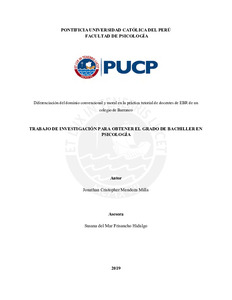| dc.contributor.advisor | Frisancho Hidalgo, Susana del Mar | |
| dc.contributor.author | Mendoza Milla, Jonathan Cristopher | |
| dc.date.accessioned | 2021-03-12T23:29:51Z | |
| dc.date.available | 2021-03-12T23:29:51Z | |
| dc.date.created | 2019 | |
| dc.date.issued | 2021-03-12 | |
| dc.identifier.uri | http://hdl.handle.net/20.500.12404/18570 | |
| dc.description.abstract | La presente investigación cualitativa tiene por objetivo conocer si los tutores de una escuela
secundaria estatal de Educación Básica Regular, del distrito de Barranco, son capaces de
diferenciar situaciones de dominio convencional o social, de situaciones de dominio moral, en su
práctica tutorial. La escuela donde se realizó el estudio contaba con 7 tutores, de los cuales 5
aceptaron formar parte del estudio. Las cinco participantes son mujeres y, en promedio, tienen 11
años cumpliendo la labor de docentes en toda su vida profesional. El método de recolección de
información fue una entrevista semiestructurada y el análisis fue temático con el objetivo de
categorizar su discurso con respecto a la diferenciación de dominios, así como en su práctica
tutorial. La investigación sugiere que las tutoras de esta escuela presentan dificultades en la
diferenciación de los dominios, es decir, actúan de manera convencional ante una situación de
índole moral, especialmente cuando esta trasgrede las normas de la Institución Educativa,
inclusive, aunque estas normas estén vulnerando derechos fundamentales como la identidad
individual y cultural. Sin embargo, las tutoras sí logran reconocer el dominio moral de una
situación cuando atenta directamente a la salud o al bienestar físico de sus estudiantes, debido a
que consideran que la vida está por encima de todo. Finalmente, esta dificultad en la diferenciación
de dominios, puede ocasionar que las tutoras no cumplan adecuadamente su labor de tutoras,
puesto que reconocer la diversidad y fomentar que el estudiante construya su identidad son
aspectos fundamentales de la tutoría. | es_ES |
| dc.description.abstract | The purpose of this qualitative research is to know if the teachers of a Regular Basic
Education high school, from Barranco district in Perú, can differentiate conventional domain
situations from moral domain situation in their tutorial practice. The school where the study was
conducted had seven tutors. However, only five tutors agreed to participate in this research. The
five tutors are women and, on average, they have eleven years being teachers in all their
professional lives. The collecting information method was a semi-structured interview and the
analysis was thematic in order to categorize their discourse regarding domain differentiation, as
well as in their tutorial practice. The research suggests the tutors of this school have difficulties in
the domain differentiation. Because of this, they act in a conventional way in a moral domain
situation, especially when it transgresses the school norms, even if these norms are violating
fundamental rights, such as individual and cultural identity. However, the tutors manage to
recognize the moral domain from a situation that threaten, directly, the health or physical wellbeing
of their students, because they believe the life is above all. Finally, this difficulty in domains
differentiation may impede the tutors from doing an appropriate tutorial practice, because
recognizing diversity and encouraging the student to build their identity are fundamental aspects
of tutoring. | es_ES |
| dc.language.iso | spa | es_ES |
| dc.publisher | Pontificia Universidad Católica del Perú | es_ES |
| dc.rights | info:eu-repo/semantics/openAccess | es_ES |
| dc.rights.uri | http://creativecommons.org/licenses/by-sa/2.5/pe/ | * |
| dc.subject | Dominio (Sociología)--Aspectos psicológicos | es_ES |
| dc.subject | Personal docente--Actitudes | es_ES |
| dc.subject | Educación secundaria--Perú--Barranco (Lima : Distrito)--Investigaciones | es_ES |
| dc.title | Diferenciación del dominio convencional y moral en la práctica tutorial de docentes de EBR de un colegio de Barranco | es_ES |
| dc.type | info:eu-repo/semantics/bachelorThesis | es_ES |
| thesis.degree.name | Bachiller en Psicología | es_ES |
| thesis.degree.level | Bachillerato | es_ES |
| thesis.degree.grantor | Pontificia Universidad Católica del Perú. Facultad de Psicología | es_ES |
| thesis.degree.discipline | Psicología | es_ES |
| renati.advisor.dni | 7779442 | |
| renati.advisor.orcid | https://orcid.org/0000-0002-5517-7597 | es_ES |
| renati.author.dni | 70001458 | |
| renati.discipline | 313016 | es_ES |
| renati.juror | - | es_ES |
| renati.level | https://purl.org/pe-repo/renati/level#bachiller | es_ES |
| renati.type | https://purl.org/pe-repo/renati/type#trabajoDeInvestigacion | es_ES |
| dc.publisher.country | PE | es_ES |
| dc.subject.ocde | http://purl.org/pe-repo/ocde/ford#5.01.00 | es_ES |






